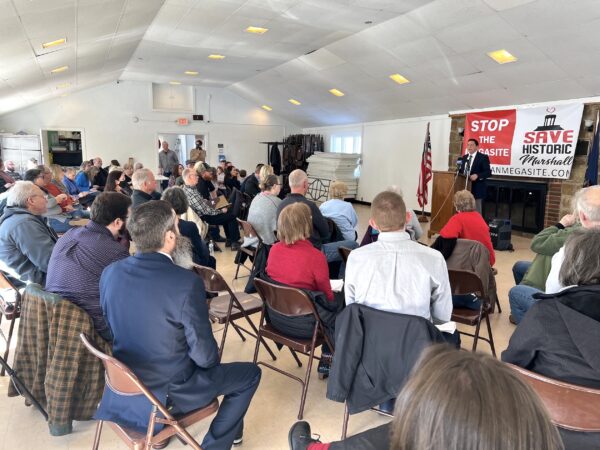Rubio Introduces Bill to Block EV Tax Credits to Ford’s Plant Using Chinese Technology
U.S. Sen. Marco Rubio (R-Fla.), the top Republican on the Senate Intelligence Committee, introduced a bill on Thursday to block subsidies to Chinese battery companies. If enacted, Ford’s new electric vehicle battery plant that licenses a Chinese battery maker’s technology will not qualify for the EV tax credits appropriated in the Inflation Reduction Act (IRA). In addition to disqualifying a U.S. company that “relies on technology via a licensing agreement with a foreign entity of concern” for the IRA tax credits, Rubio’s bill includes other categories, such as an American company under the substantial influence of a foreign entity of concern, 20 percent or more owned by a foreign entity of concern, or a joint venture with at least one partner that is considered a foreign entity of concern. Any entities governed by a “covered nation” are considered foreign entities of concern. The current covered nation list includes China, North Korea, Russia, and Iran. In response to Rubio, Ford said that “making those batteries here at home is much better than continuing to rely exclusively on foreign imports, like other auto companies do. A wholly-owned Ford subsidiary alone will build, own and operate this plant. No other entity will get U.S. tax dollars for this project.” Last month, Ford announced a deal with Chinese EV battery maker Contemporary Amperex Technology Co. Ltd. (CATL) to build a battery park in Marshall, Michigan. The plant will start operating in 2026 and will be a wholly-owned subsidiary of the American company; CATL will provide the battery technology, some equipment, and workers. C Drive North pictured on March 11, 2023. The farmland on the other side of the street is the site slated for the new Ford electric vehicle battery park. (NTD) On the same day of the deal announcement, Rubio wrote a letter to the Secretaries of Treasury, Energy, and Transportation, asking for a Committee on Foreign Investment in the United States (CFIUS) review of the Ford-CATL licensing agreement. He said in the February press release that he wanted to ensure no taxpayer dollars would “go to enrich PRC national champion CATL, or any other Beijing-supported company, directly or indirectly.” Nick Iacovella, a spokesperson for the Coalition for a Prosperous America (CPA), previously told The Epoch Times that the production tax credit amount for the Ford-CATL battery plant could reach $1 billion, depending on the exact terms of the licensing agreement, given the factory’s annual capacity of 35 gigawatt-hours, or 35 million kilowatt-hours, and the IRA advanced manufacturing tax credit of $45 per kilowatt-hour. CPA is an advocacy organization representing exclusively manufacturers that have productions in the United States. Ford is not a member of the CPA. Community members gather for a press conference objecting to using taxpayer dollars to fund a Ford electric vehicle battery plant partnered with a Chinese company with ties to the Chinese Communist Party in Marshall, Mich., on March 11, 2023. (NTD) In an op-ed on Newsweek, Rubio called EVs a “Trojan horse that Beijing will use to threaten, divide, and outcompete the U.S.” “Ford’s massive project will bring 2,500 new jobs to Marshall’s small, historic farming community, but it will also bring America’s greatest geopolitical adversary into the heartland,” he added.

U.S. Sen. Marco Rubio (R-Fla.), the top Republican on the Senate Intelligence Committee, introduced a bill on Thursday to block subsidies to Chinese battery companies.
If enacted, Ford’s new electric vehicle battery plant that licenses a Chinese battery maker’s technology will not qualify for the EV tax credits appropriated in the Inflation Reduction Act (IRA).
In addition to disqualifying a U.S. company that “relies on technology via a licensing agreement with a foreign entity of concern” for the IRA tax credits, Rubio’s bill includes other categories, such as an American company under the substantial influence of a foreign entity of concern, 20 percent or more owned by a foreign entity of concern, or a joint venture with at least one partner that is considered a foreign entity of concern.
Any entities governed by a “covered nation” are considered foreign entities of concern. The current covered nation list includes China, North Korea, Russia, and Iran.
In response to Rubio, Ford said that “making those batteries here at home is much better than continuing to rely exclusively on foreign imports, like other auto companies do. A wholly-owned Ford subsidiary alone will build, own and operate this plant. No other entity will get U.S. tax dollars for this project.”
Last month, Ford announced a deal with Chinese EV battery maker Contemporary Amperex Technology Co. Ltd. (CATL) to build a battery park in Marshall, Michigan. The plant will start operating in 2026 and will be a wholly-owned subsidiary of the American company; CATL will provide the battery technology, some equipment, and workers.

On the same day of the deal announcement, Rubio wrote a letter to the Secretaries of Treasury, Energy, and Transportation, asking for a Committee on Foreign Investment in the United States (CFIUS) review of the Ford-CATL licensing agreement. He said in the February press release that he wanted to ensure no taxpayer dollars would “go to enrich PRC national champion CATL, or any other Beijing-supported company, directly or indirectly.”
Nick Iacovella, a spokesperson for the Coalition for a Prosperous America (CPA), previously told The Epoch Times that the production tax credit amount for the Ford-CATL battery plant could reach $1 billion, depending on the exact terms of the licensing agreement, given the factory’s annual capacity of 35 gigawatt-hours, or 35 million kilowatt-hours, and the IRA advanced manufacturing tax credit of $45 per kilowatt-hour. CPA is an advocacy organization representing exclusively manufacturers that have productions in the United States. Ford is not a member of the CPA.

In an op-ed on Newsweek, Rubio called EVs a “Trojan horse that Beijing will use to threaten, divide, and outcompete the U.S.”
“Ford’s massive project will bring 2,500 new jobs to Marshall’s small, historic farming community, but it will also bring America’s greatest geopolitical adversary into the heartland,” he added.












